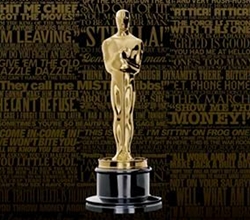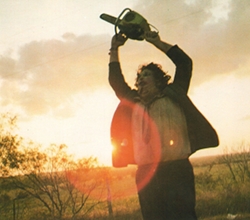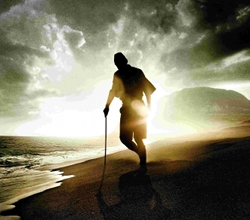Review: Mystic River (2003)
His brief flirtation with widespread acclaim long gone by 2003, Eastwood seemed a director well past the prime of his career. Never one to go down without a fight, he burst energetically back onto the scene with Mystic River, a shockingly dark return to form. Earning some seven Oscar nominations — including his second for Best Picture and Best Director — the film made good on the promise of great things yet to come which Eastwood had made with Space Cowboys.
After the brutal murder of nineteen year old Katie, her ex-con cum businessman father Jimmy becomes reunited with childhood friends Sean — one of the detectives investigating — and Dave — one of the last people to have seen her alive. The disbanded trio are haunted by a shared childhood trauma, the daunting after-effects of which hang ominously over this modern horror.
Opening with the aforementioned childhood trauma, Mystic River gives us but a fleeting moment in the company of our three protagonists before all joy is wrenched from them. Caught vandalizing some freshly poured cement, the trio are chastised by a badge-wielding adult who quickly bundles Dave — the only of the three not to live on the same street — into the back of his car. There is something in the way Eastwood composes the scene that informs us something is amiss, Dave’s terrified young face peering out the rear window of the car causing our stomachs to sink with the uncomfortable realization that this man is not who he claims.
There is an almost claustrophobic sensation of unease to this scene; a sickening tension that runs throughout the film, never giving us the satisfaction of comfort. Eastwood’s choice of subject matter is unrelentingly dark, his pace dramatically slow; he builds tension sublimely and delivers information sparingly, only giving us the bare minimum and never allowing us to see what lies around the corner. This sense of mystery arises not from the murder, however, but rather from the characters: their motivations; their thoughts; their emotions. The revelation of the details behind the central murder is of little consequence beside the reality of these characters, and our struggle to understand what drives them.
Perhaps the most pervasive theme to be found in Eastwood’s oeuvre is masculinity; having himself risen to fame as one of the screen’s most enduring cultural icons of tough masculinity, few—if indeed any—of his films have not in some way addressed issues of what it means to be a man. If this is the raison d’être behind Eastwood’s work as a director, Mystic River may well be his most important film. Each of the film’s protagonists is, in some way, emasculated: Jimmy by the murder of his daughter, denying him the father’s crucial role of protection; Sean by his wife’s desertion of him, leaving him broken and needful; Dave by his molestation as a child, freezing him in his youth and never allowing him to become a man in the first place. The driving force behind these characters, and behind the film itself, is their need to reclaim their respective masculinities, each decision they make guided by this goal that occupies their every thought.
Conveying the complexities of these characters is no simple task, but the considerable burden finds strong shoulders in an incredible cast. In the role of Dave, Tim Robbins gives an astonishing performance, creating flawlessly the helpless boyish innocence which is so crucial to the empathetic effect upon which his character hinges. Any of Mystic River’s leads could carry a film alone on the strength of their performance, the pained fury of Sean Penn and fatigued loneliness of Kevin Bacon no less engaging than Robbins, and bringing to life characters whose stories and emotions we are equally as intrigued to follow, however far from the light of redemption they may stray.
Having joined the Eastwood team with Blood Work, cinematographer Tom Stern here shows his true skill, taking the low-key noirish lighting preferred by Eastwood to the next level in consummate darkness. Characters’ faces are separated from the pitch black backgrounds only by the faintest tracings of light across their features, expressing beautifully their constant residence on the precipice of inescapable moral turpitude. Mystic River is a film which raises question its characters are powerless to answer, throwing them into a void of jarring uncertainty and forcing them to make difficult decisions. How does our past shape us? Can the horrors of what we have experienced or what we have done ever be overcome? Can the brutal violence of vengeance ever be truly justified?
Eastwood is intelligent enough to leave these questions hanging over the film’s closing credits, putting it to the audience to formulate their own answers. His probing and uncompromising dissection of morality is unafraid of holding back, pushing his scenes and characters to hideous conclusions in order to ask tough and challenging questions. This is a film that invades your head, takes root within the concrete set of morels by which you live your life, and stays buried there, a constant insatiable little voice of doubt, all but impossible to forget.
Arriving at a time when the director seemed dangerously close to being irredeemably beyond his prime, Mystic River is a staggeringly challenging film, bombarding its audience with difficult questions and throwing them into a vast sea of moral dilemmas, dark imagery, and pervasive emotions. A beautiful work of art despite the ugly darkness of its gripping subject matter, it constitutes the definitive return of one of America’s greatest filmmakers.
-
http://twitter.com/NextProjection Christopher Misch
-
http://twitter.com/baronronan Baron Ronan Doyle
-
Courtney Lee














 Review: The Future (2011)
Review: The Future (2011) Review: The Puppetmaster (1993)
Review: The Puppetmaster (1993) Review: The Tree Of Life (2011)
Review: The Tree Of Life (2011) Review: Happythankyoumoreplease (2010)
Review: Happythankyoumoreplease (2010) Review: Mystic River (2003)
Review: Mystic River (2003)






